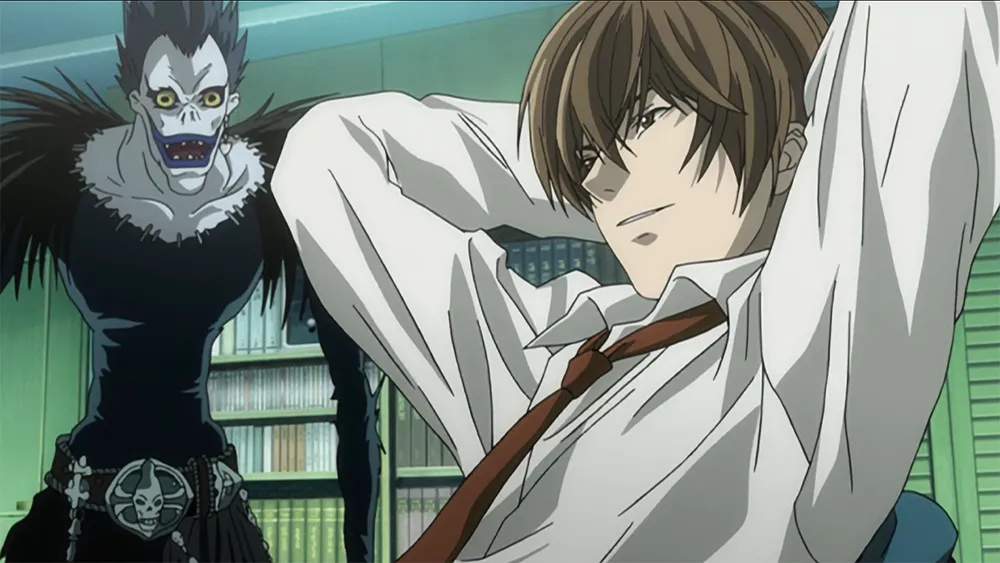“Death Note” is one of the most iconic psychological anime, seamlessly blending intense psychological tension, mystery, and supernatural elements. If fans of “Death Note” are seeking more anime that challenge the mind and stir emotions, these five anime will surely satisfy.
5. Odd Taxi (2024)
While “Odd Taxi” might initially appear to be a lighthearted and quirky anime with its childish art style and animal-like anthropomorphic characters, beneath the innocent exterior lies a complex psychological mystery that unravels over time.
The story follows Hiroshi Odokawa, a socially awkward and reclusive taxi driver who becomes entangled in the mysterious disappearance of a high school girl. As Odokawa’s journey unfolds, he encounters various individuals, each with their own secrets and psychological burdens. Like “Death Note”, “Odd Taxi” carefully balances suspense and tension, leaving viewers on the edge of their seats as they try to piece together the intricate puzzle.
With its unique approach to storytelling and unconventional characters, “Odd Taxi” explores themes of isolation, deception, and self-identity in a way that parallels the mental games found in “Death Note”.
4. Terror in Resonance (2014)
Also known as “Zankyou no Terror”, this anime dives deep into the psychological and political implications of terrorism and social manipulation. Directed by the legendary Shinichirō Watanabe and produced by MAPPA Studio, “Terror in Resonance” follows two teenagers, Nine and Twelve, who carry out attacks in Tokyo under the alias “Sphinx.”
Their real motivation stems from their tragic past tied to government experimentation, and the show delves into the trauma and moral ambiguity of their actions. Much like “Death Note”, “Terror in Resonance” keeps the audience questioning the morality of its characters and their decisions, creating a tension-filled atmosphere that lingers throughout the series.
Fans of morally complex characters and deep psychological themes will appreciate “Terror in Resonance”, which challenges viewers to think about justice, revenge, and the consequences of past trauma.
3. Sonny Boy (2024)
Written and directed by Shingo Natsume, “Sonny Boy” offers a mind-bending, philosophical story that examines the human condition through an abstract lens. The plot centers around a group of high school students whose school drifts into another dimension, which they name “This World.” In this new reality, they discover that the laws of physics have changed, and many of them develop supernatural powers.
Instead of focusing on flashy battles, the anime delves into psychological and philosophical themes. Each episode feels like a puzzle, forcing the viewer to deeply ponder the abstract storytelling, reminiscent of the mental gymnastics one experiences when watching “Death Note”.
If you enjoy thought-provoking stories that challenge the nature of reality and explore existential themes, “Sonny Boy” will captivate you with its unique narrative structure and philosophical depth.
2. Steins;Gate (2011)
Though slightly older, “Steins;Gate” is a timeless masterpiece that any fan of psychological thrillers, like “Death Note”, must watch. The story follows self-proclaimed mad scientist Rintaro Okabe as he and his friends stumble upon a way to send messages back in time, altering the course of history.
Like “Death Note”, “Steins;Gate” masterfully balances intellectual tension and emotional depth. Both shows feature protagonists burdened by their genius and the weight of their moral decisions, with unpredictable consequences shaping the story. The themes of time travel, causality, and the ethics of altering the past make this anime both intellectually stimulating and emotionally gripping.
For fans of mind-bending, high-stakes plots with profound emotional resonance, “Steins;Gate” delivers a deeply satisfying psychological experience.
1. The Flowers of Evil (2013)
Based on the manga by Shūzō Oshimi, “The Flowers of Evil” (Aku no Hana) elevates psychological complexity to new heights. The story revolves around Takao Kasuga, a middle school student who steals the gym clothes of his crush, Saeki. This small act spirals into a series of psychological manipulations and blackmail by Sawa Nakamura, a classmate who uses Kasuga’s shame to force him into doing morally questionable things.
The tension escalates as Nakamura’s dark and twisted nature begins to unfold, revealing the psychological and emotional depth of the characters. The unique rotoscoped animation style enhances the unsettling and eerie atmosphere, making the show visually distinct. What truly sets “The Flowers of Evil” apart is its raw, unfiltered exploration of human desires, guilt, and self-destruction.
For those who appreciate dark, unflinching examinations of the human psyche, “The Flowers of Evil” offers an intense psychological dive into shame, guilt, and the darkest corners of the human soul.
